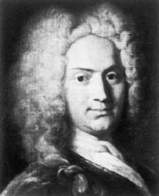

Nicolaus Bernoulli was a nephew of Jacob Bernoulli and Johann Bernoulli, two other famous mathematicians. His early education involved studying mathematics with his uncles. In fact it
was Jacob Bernoulli who supervised Nicolaus's Master's degree at the University of Basel, which he was awarded in 1704. Five years later he was received a
doctorate for a dissertation which studied the application of probability theory to certain legal questions.
In 1712, Bernoulli toured Europe visiting Holland, England and France. It was in France that he met Montmort and the two mathematicians
became close friends and collaborated on mathematical questions in a long correspondence.
Bernoulli was appointed to Galileo's chair at Padua in 1716. There he
worked on geometry and differential equations. In 1722, he left Italy and returned to his home town to take up the chair of logic at the University of Basel.
After 9 years, he was appointed to he chair of law. In addition to these academic appointments, he did 4 periods as rector of the university.
Bernoulli was a gifted but not very productive mathematician. As a result, his most important achievements are hidden throughout his correspondence, which comprises about 560 items.
From Montmort's work we can see that Bernoulli formulated certain problems in the theory of probability, in particular the problem which today is known as
the St. Petersburg problem. Nicolaus also corresponded with Leibniz during the years 1712 to 1716. In these letters Nicolaus discussed questions of convergence.
Nicolaus also corresponded with Euler. In these letters, he criticises Euler's indiscriminate use of divergent series. In this correspondence, he also showed that the sum of 1/n2 is π2/6, which had confounded Leibniz and Jacob Bernoulli.
Other problems he worked on involved differential equations. He studied the problem of orthogonal trajectories, making important contributions by the construction of orthogonal trajectories to families of curves, and he proved the equality of mixed
second-order partial derivatives. He also made significant contributions in studying the Riccati equation.
Bernoulli received many honours for his work. For example he was elected a member of the Berlin Academy in 1713, a Fellow of the Royal Society of London in 1714, and a member of the Academy of Bologna in 1724.